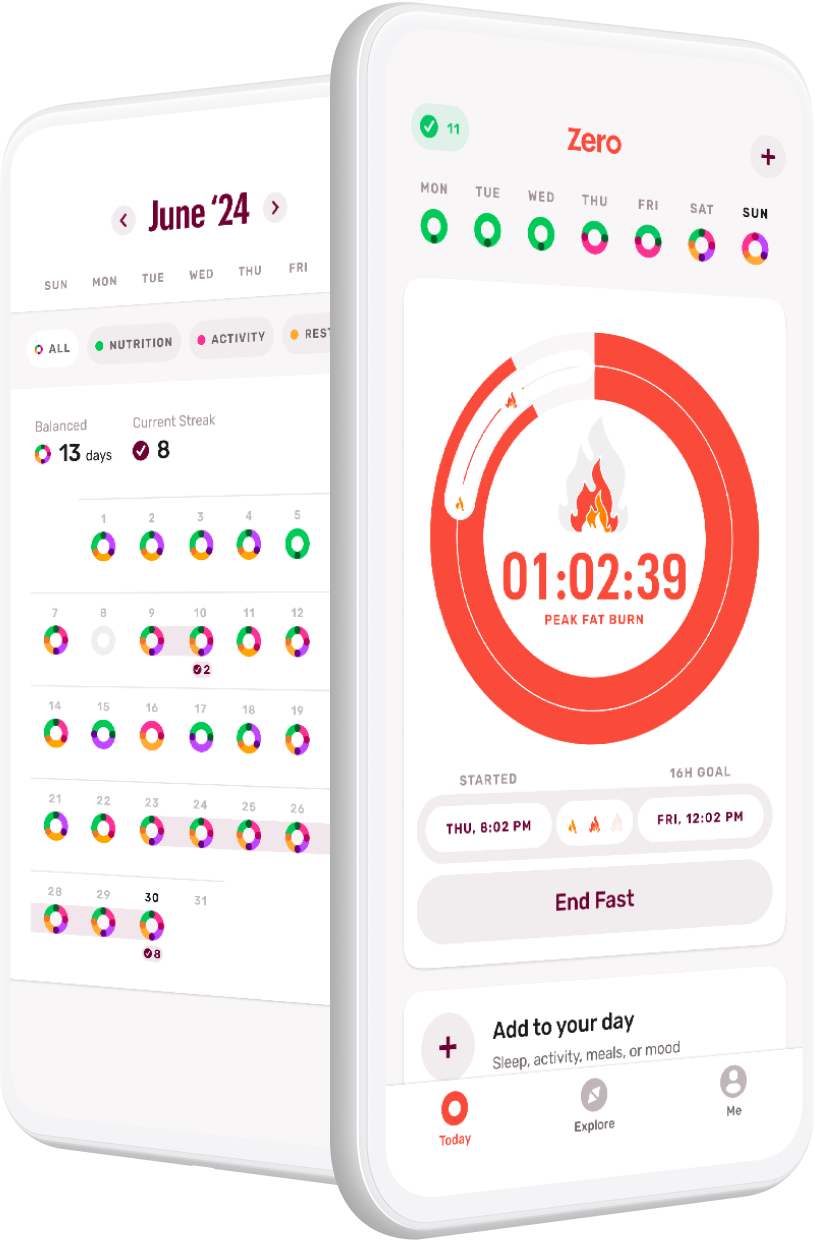Written and medically reviewed by Rich LaFountain, PhD
Morning workouts are popular and for good reason. Aside from the large availability of a.m. workout classes and compatibility with a typical workday, a morning workout — particularly a fasted morning workout — jumpstarts your metabolism, helping you burn more calories throughout the day. Morning exercise can also boost energy levels and improve mood by setting a positive tone for the day. Moreover, working out in the morning ensures you prioritize your fitness goals before scheduled (and unscheduled) daily activities get underway. Before undertaking a new routine, consider our guidelines for success to plan your intermittent fasting morning workout.
The Science Behind Intermittent Fasting and Morning Workouts
Morning fasted exercise refers to physical activity performed on an empty stomach, typically in the morning before eating. Research suggests that exercising in a fasted state can enhance fat burning, improve insulin sensitivity, and increase metabolic flexibility. Fasted workouts may also boost growth-hormone levels and promote weight loss. However, individual responses vary, and factors like exercise intensity and duration play a role in how your body is impacted from any given workout.
How Fasting Affects Your Metabolism
When you’ve fasted for at least 12 hours, your body depletes glucose and glycogen stores from your most recent meals — resulting in your body progressively burning more fat for fuel. This can contribute to weight loss and improved body composition over time. Additionally, fasting overnight reduces insulin levels in the body, making stored fat more accessible for energy while you exercise.
Benefits of Exercising on an Empty Stomach
Exercising after an overnight fast is a popular way to tap into the unique benefits associated with exercising on an empty stomach. Fasted exercise is a great way to amplify your fat burn rate compared with fed-state exercise. Exercising in the morning before you break your fast can set your internal cellular clock for improved circadian rhythm, reduce hunger cues, enhance your cognitive function, and even help open up some free time in your hectic schedule.
If one of the first things you do is exercise in the morning, then you are starting the day off right! Moving your body is a key signal to break sleep inertia and grogginess after you wake up. You do not have to engage in high-intensity exercise; even light physical activity will help you establish a healthy schedule within your cells so that you gain energy during the day and sleep great at night. Bonus points if you can get outside to move and benefit from natural light, which also reinforces healthy sleep transition about 16 hours after the light hits your eyeballs.
If you are newer to intermittent fasting or you are finding it challenging to reach your fast-duration target through the traditional breakfast hours, then physical activity allows you to engage in a healthy habit while you kill some time until your fast is over. Research suggests exercise or physical activity is more than just a healthy and convenient distraction — it will also reduce your hunger and cravings because your body naturally will tap into additional stored fuels, thus reducing appetite. In addition, your exercise will impact your body’s ability to absorb nutrients when it’s time to finally break your fast so that you can maximally benefit from that meal.
Exercising on an empty stomach, i.e., before eating for the day, has a number of benefits. First, it can boost mental clarity through several mechanisms. Physical activity increases blood flow and oxygen delivery to the brain, enhancing cognitive function and alertness. Additionally, fasted exercise stimulates the release of neurotransmitters like dopamine and endorphins, which can improve mood and focus. This combination of physiological effects results in improved cognitive performance after a morning workout. Morning exercise (fasted or otherwise) can also contribute to how you might perform at work or school. A 2019 study in the British Journal of Medicine found that even moderate exercise, such as walking, can positively impact attention span, decision-making, and visual learning.
Finally, exercising after an overnight fast also comes with a scheduling benefit, as there is no need to take the time to prepare a meal and then wait to digest the meal before working out in the morning. Most people who enjoy intermittent fasting love that there are scheduling and productivity benefits that also accompany the wide range of health benefits of intermittent fasting. Exercising on an empty stomach might allow you to invest in habits you have difficulty finding time for, like morning journaling, reading, setting some time aside for sipping your morning coffee, or even a few extra minutes of sleep.
Hormonal Shifts During IF and Exercise
During fasted exercise, your body relies on burning stored energy, so insulin levels — which rise when the body is in the process of storing energy instead of burning energy it has already stored — are typically lower. High insulin levels promote energy or even fat storage, while lower insulin levels promote increased secretion of growth hormone to repair and build tissues like muscle. Growth hormone plays a primary role in metabolism, fat burning, and muscle growth. Additionally, fasted exercise may also influence other hormones such as adrenaline and cortisol, which can impact energy metabolism and stress response.
Actionable Tips for Successful Intermittent-Fasting Morning Workouts
So, you’re already committed to a morning workout: Now what? Consider what type of exercise routine might be the best for your preferences, fitness level, and health goals.
Choose the Right Intermittent-Fasting Schedule
High-intensity interval training (HIIT), resistance training, and endurance exercises, such as running or cycling, are more likely to have a significant hormonal impact, especially when performed in a fasted state. These types of exercises typically induce greater physiological stress and metabolic demands, leading to more pronounced hormonal responses, such as increased secretion of growth hormone, adrenaline, and cortisol, which promote fat burning as well as muscle-tissue growth and repair. Additionally, resistance training specifically can promote muscle growth and metabolic adaptations that further influence hormone levels.
Fast Before Cardio
Performing cardio in a fasted state can offer several benefits. First, it may enhance fat oxidation, meaning your body burns more fat for fuel during the exercise session. Additionally, fasted cardio can improve insulin sensitivity, potentially aiding in blood-sugar regulation and reducing the risk of insulin resistance over time. Some people also report feeling more energized and focused during their cardio sessions when they fast ahead of time. However, individual responses may vary, and it’s essential to consider factors like exercise intensity, duration, and overall health goals when incorporating fasted cardio into your routine.
Fuel Up Before Weight Training
If you plan to do a morning fasted workout that involves weights, consider how you fuel your body the night or evening before. Fueling up before weight training is crucial for optimal performance and muscle growth. Consuming carbohydrates and protein before a workout provides the energy and nutrients your muscles need to perform at their best. Carbohydrates replenish glycogen stores, providing readily available energy, while protein supplies amino acids that are necessary for muscle repair and growth. Having adequate fuel before weight training enhances strength, endurance, and recovery, allowing you to lift heavier weights, complete more reps, and stimulate muscle growth effectively. This pre-workout nutrition strategy ensures you maximize your training potential and achieve better results from your workouts.
Always Hydrate
Maintaining your hydration is crucial for sustaining your active lifestyle, preventing dehydration, and supporting overall well-being, especially if you intend to perform fasted exercise. When fasting, the risk of dehydration rises due to reduced fluid intake — you’re not having liquids with meals and you’re not consuming foods with high water content because you’re not eating food while fasting.
Adequate hydration ensures proper circulation, nutrient delivery to muscles, and temperature regulation during workouts. Dehydration can lead to fatigue, dizziness, and impaired cognitive function, compromising exercise performance and increasing the risk of injury. Therefore, drinking water before, during, and after fasted exercise is essential to optimize hydration levels, enhance endurance, and support the body’s physiological processes.
During exercise, sip water regularly. Aim to consume at least 8–16 ounces every 15–20 minutes, depending on the intensity and duration of your workout. During a day of fasted exercise, keep an eye on your urine color; pale yellow indicates adequate hydration. Finally, listen to your body’s thirst cues and drink accordingly to maintain optimal hydration levels.
Supplement Strategically
Active individuals, especially those pursuing weight training, need to prioritize a balanced diet of minimally processed carbohydrates, protein, and healthy fat to maintain energy and metabolic health.
Here are some other supplements to consider melding with your active intermittent fasting lifestyle.
- Caffeine: Caffeine can enhance energy levels and focus during fasted exercise, potentially improving performance. (Note: Avoid overconsumption of caffeine to avoid side effects. Stick to one or two cups of black coffee or tea, and be sure to hydrate with water, too.)
- Creatine: Creatine is fast-friendly and can improve your ability to train working muscles because it increases your ability to generate energy and eke out that last rep or two of each set. Therefore, creatine contributes to more effective resistance training which leads to greater strength and power benefits over time. Creatine has also been shown to have a variety of additional benefits related to metabolic and cognitive health.
- Electrolytes: Electrolyte supplements that include sodium and magnesium can help maintain hydration and electrolyte balance, especially during fasted exercise sessions lasting longer than 45–60 minutes.
- Protein: Protein is an essential nutrient, so you must get it from your diet. If you are struggling to meet your protein needs with your meals and snacks throughout your eating window, consider adding a protein supplement to help you maintain and grow healthy muscle.
Always consult with a healthcare professional before starting any new supplement regimen, especially when combining supplements with fasted exercise or if you have underlying health conditions.
Listen to Your Body
Check in with your energy levels and overall feeling of clarity before you exercise. Trusting your body’s signals is the best policy during exercise of any kind and particularly during fasted exercise. If you feel excessively fatigued or dizzy, it may be a sign that your body needs fuel. During exercise, monitor your heart rate, breathing, and how your body and muscles feel. If you notice unusual discomfort, lightheadedness, or weakness, consider slowing down or stopping to prevent injury. Additionally, stay hydrated and be mindful of signs of dehydration such as excessive thirst or dark urine.
What’s the Best Workout to Pair with Intermittent Fasting?
Ultimately, the best workout to pair with intermittent fasting is one that makes you feel good and can be consistently incorporated into your routine. It’s essential to listen to your body and adjust your workouts as needed to ensure they complement your intermittent-fasting plan effectively.
Most people can benefit from moderate walking, jogging, or cycling to get the most out of their fasted state. Those with more aggressive goals should consider weight training or HIIT if they feel it’s compatible with their fitness level and lifestyle.
Is Working Out While Fasting for 48 Hours a Good Idea?
While there are benefits to a multi-day fast, it’s generally not recommended for most people and could be dangerous to combine with fitness. Extended fasting periods without adequate nutrition can lead to muscle loss, fatigue, impaired performance, and potential health risks. If you want to work out while fasting, the safest bet is to stick to daily 12–18-hour fasts and get that workout done first thing in the morning!
Ready to start using Zero? Take the quiz or download the app today.
- Debunking 3 Myths Around Fasting and Thyroid Health - April 15, 2024
- Breaking Down Fast Breakers: How to Tell If Something Will Break Your Fast - March 4, 2024
- GLP-1s and Weight-Loss Medications vs. Lifestyle Interventions: What’s Right for You - February 5, 2024


